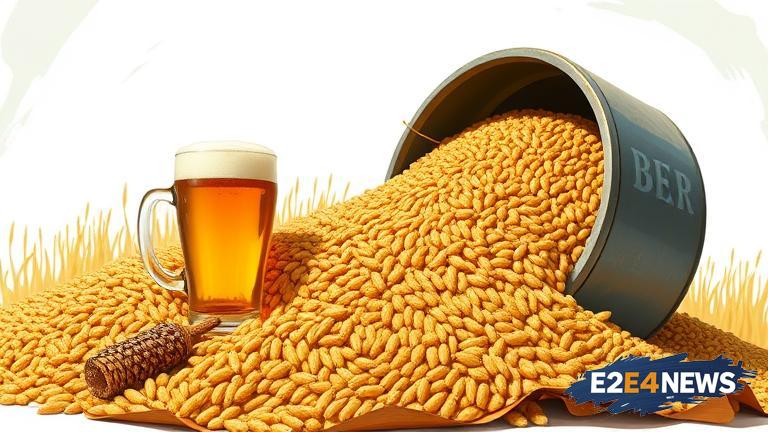The brewing industry has long been plagued by the issue of waste management, with millions of tons of beer grain waste generated annually. However, a team of innovative Australian researchers has made a significant breakthrough in converting this waste into sustainable products. This pioneering approach not only reduces waste but also promotes eco-friendly practices, aligning with the growing demand for environmentally responsible businesses. The process involves utilizing microorganisms to break down the complex compounds found in beer grain waste, resulting in the production of valuable chemicals, biofuels, and animal feed. This technology has the potential to revolutionize the brewing industry, enabling companies to minimize their environmental footprint while generating additional revenue streams. The researchers’ findings have been met with enthusiasm from industry leaders, who recognize the vast potential of this sustainable solution. By embracing this innovative approach, breweries can reduce their waste disposal costs, lower their carbon emissions, and contribute to a more circular economy. Furthermore, the production of biofuels from beer grain waste can help reduce greenhouse gas emissions, mitigating the impacts of climate change. The animal feed generated from this process is also of high quality, providing a nutritious and sustainable option for livestock farmers. As the world grapples with the challenges of sustainability, this breakthrough technology offers a beacon of hope for the brewing industry. With the global beer market projected to continue growing, the need for sustainable waste management solutions has become increasingly pressing. The Australian researchers’ discovery is a testament to the power of innovation and collaboration, demonstrating that even the most seemingly insurmountable challenges can be overcome with determination and expertise. As the brewing industry continues to evolve, it is likely that we will see widespread adoption of this technology, driving a more sustainable future for generations to come. The potential applications of this technology extend far beyond the brewing industry, with possibilities for implementation in other sectors where organic waste is generated. The development of this sustainable solution is a significant step forward in the quest for a more circular economy, where waste is minimized and resources are utilized efficiently. By harnessing the power of microorganisms, the researchers have created a game-changing technology that is poised to transform the brewing industry and inspire other sectors to follow suit. As consumers become increasingly environmentally conscious, companies that prioritize sustainability are likely to reap significant benefits, from enhanced brand reputation to increased customer loyalty. The brewing industry’s shift towards sustainability is not only a moral imperative but also a sound business strategy, as companies that fail to adapt risk being left behind. In conclusion, the transformation of beer grain waste into sustainable products is a groundbreaking achievement that promises to revolutionize the brewing industry and inspire a more sustainable future. With its potential to reduce waste, promote eco-friendly practices, and generate additional revenue streams, this technology is an exciting development that is sure to make waves in the years to come. The researchers’ innovative approach serves as a powerful reminder of the importance of investing in sustainability and embracing cutting-edge technologies to drive positive change. As the world continues to grapple with the challenges of environmental sustainability, this breakthrough technology offers a beacon of hope for a brighter, more sustainable future.
